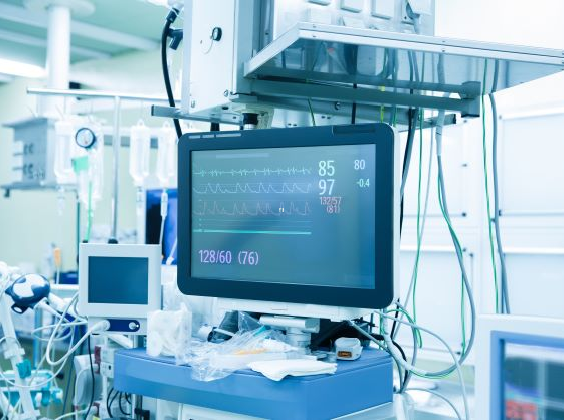
Written by

Cranfield, UK, 30th April 2024, Written by Kelly Patrick –
In this monthly news round up, I offer some of the latest news and developments impacting the clinical care markets that caught my eye in recent weeks, including my thoughts on the implications for the market.
1. Smiths Medical ASD joins Philips in the recall saga
Smiths Medical ASD is the latest vendor to enter the list of ventilator manufacturers who have recalled ventilators due to safety concerns. Earlier this month the FDA announced that the company had recalled its PneuPac ParaPAC Plus 300 and 310 ventilator kits for a malfunction causing non-cycling, continuous positive gas flow and preventing proper ventilation. In total, just under 3000 devices have been recalled that were distributed between 2010 to 2023. The paraPAC Plus ventilators are typically used in transport and emergency situations, offering ventilatory support for adults, children, and infants.
The announcement came prior to fellow ventilator manufacturer Philips claimed it had reached an agreementwith the FDA on the consent decree, following the recall that affected a significant number of its respiratory and sleep solutions. The consent decree provides a roadmap for Philips to remediate the recalls and stipulates the necessary steps required to enable their ventilator and sleep solutions to re-enter the market once all requirements have been met. Since the initial stages of the recall, Philips has invested heavily to improve the patient safety and quality of its solutions. The recall has no doubt had an impact on its brand reputation, and the company has made every step to further mitigate this. It is certain that the ventilator market is likely to see continued pressure in the next few months as products will being increasingly scrutinised to ensure patient safety is of highest paramount.
2. Roche teams up with Prenosis on AI sepsis tool
Prenosis gained De Novo FDA approval earlier in April for its artificial intelligence-powered diagnostic tool for sepsis. As such Prenosis is the first vendor to be able to obtain FDA marketing authorization of an AI diagnostic tool for sepsis. The Sepsis ImmunoScore, uses 22 different parameters including temperature, heart rate and cell counts to help clinicians assess a patient’s risk of sepsis. The tool can be integrated directly into the electronic health record and embedded into the hospitals workflow. Roche has agreed to include Prenosis’ AI sepsis tool algorithm as part of its wider Navify Algorithm Suite sold to the US market. Prenosis’ relationship with Roche will enable the company to increases its potential reach to the US market, enabling further integration with many of Roche’s existing customers.
3. Eko Health gains FDA approval for stethoscope for heart failure detection
Eko Health has also gained 510k clearance for its AI-based stethoscope system for the detection of heart failure. According to Eko health, its Low Ejection Fraction Tool (ELEFT) is an AI-enabled tool that allows providers to detect low ejection fraction in 15 seconds during a routine exam using an Eko stethoscope. The ELEFT will be added to its cardiac early detection platform. The platform is targeted toward primary care facilities, that often do not have the access to echocardiography solutions due to restricted budgets. Eko Health hopes that by incorporating the tool into a readily used device such as the stethoscope, it will improve the possibility of detecting heart failure earlier in the patient prognosis. Eko Health has gained $95 million in funding in the last 3 years which has enabled the vendor to further develop its algorithms. Furthermore, in July 2023 Eko Health announced a global license and supply partnership with Japanese Life Sciences company Astellas Pharma. Under the terms of the agreement, Astellas will integrate Eko Health’s Core 500 digital stethoscope (which includes an AI-powered 3-lead ECG) into existing partner Welldoc’s chronic condition management platform, to create a proprietary, non-invasive device-DTx solution for patients with heart failure.
4. Wireless ECG patch shows 95.7% success rate in heart failure detection
Focusing on the Diagnostic Cardiology market, Peerbridge Health has released the findings from a study on its feasibility trial. The trial unveiled that its wireless ECG patch had just under a 96% accuracy rate in identifying heart failure in patients utilising ECG as the only input. Peerbridge gained FDA marketing clearance approval for its CorTM Multi-channel Remote ECG Monitor in 2017. The company states that it will have a full pivotal trial for its solution later in the year.
Signify Research assessed the development of AI solutions in the ECG device market in its report on the AI in ECG market published earlier this year. The report author, @Gareth Jones, claims that ‘Despite a highly fluid regulatory environment, coupled with considerably less funding than has been raised for AI in Medical Imaging, vendors are nevertheless developing a algorithms for a huge range of applications. These include those for diagnosing myocardial infarction and cardiomyopathy, predicting the future occurrence of arrythmias, and mapping the heart to assist electrophysiologists with ablation procedures.’ The cardiac market is fast becoming a key target for the use of AI algorithms to help improve cardiac care.
5. Avive Solutions raised $56.5 million in growth equity
Portable defibrillator manufacturer Avive Solutions has raised $56.5 million in funding to support its expansion and commercial activities. To date, the company has installed a number of connected defibrillators across the US, enabling quicker reaction times to patients undergoing cardiac arrest. It has mapped out its ‘4-minute initiative’ to enable strategic location of its AEDs to enable both emergency services and bystanders to react to patients undergoing cardiac arrest. Its solutions have wireless communication enabling devices to be remotely monitored and serviced appropriately. To date, Avive Solutions have been rolled out in four cities in the US, and will utilise the funding to roll out further across the US in 2024. It is hoped that the increased accessibility to connected AED solutions will help to improve survival rates from cardiac arrest.
6. Omron Healthcare acquires Luscii healthcare
Home health device manufacturer Omron Healthcare has announced its intention to acquire digital health provider Luscii Healthcare. Luscii Healthcare provides a scalable customisable platform utilised in remote patient monitoring. The app is capable of monitoring over 150 diseases including cardiovascular and respiratory illnesses. It is currently present in a number of countries in the EMEA region including the Netherlands, the UK and Germany. Luscii’s RPM platform has three broad use-cases: i) virtual wards, ii) remote monitoring support, predominantly for chronic condition patients such (e.g., CODP, Diabetes) but also some episodic care (pre & post-surgery etc.,), iii) and self care, mainly from primary care, where low acuity patients are managed and coached 100% by algorithms on the platform. Omron Healthcare claims that ‘its insight into the primary care remote patient monitoring market in the UK and Europe will enable Luscii to develop comprehensive services to support healthcare professionals in an integrated way, ranging from general practitioners to hospitals, within a single platform. This acquisition aims to elevate the standard of remote patient monitoring (RPM) services, contributing to a future where the impact of various diseases is minimized.’
Similarly Medixine has also announced that it is working with Nonin to co-develop its RPM services, expanding its presence in the US market. As discussed in Signify Research’s recently published Remote Patient Monitoring report, Nordic based companies such as Medixine have succeeded in recent years to expand their presence internationally. Medixine’s remote patient monitoring software platform will be used to integrate with Nonin’s wearable solutions to optimise data flow accessibility to clinicians.
7. Draft American Privacy Rights Act (APRA) to protect patient data from consumer health devices
With the plethora of consumer devices now capable of collecting a significant amount of patient data, the need for regulation to protect its use is even more paramount. As such, on the 17th April, the House Energy and Commerce Subcommittee on Innovation held a hearing to discuss the proposed American Privacy Rights Act (APRA). The hearing discussed the proposed bill that will enable patients to be in control of how their personal data is utilised beyond the realm of the Health Insurance Portability and Accountability Act (HIPAA). The APRA will focus on providing stricter controls on data gathering, sharing, access and use between technology companies such as social media platforms and healthcare entities. It will also focus on the use of AI algorithms that collect consumer data without prior consent. Although currently in its draft form, the bill will certainly be something home health technology vendors will need to take heed of once enacted, to ensure proper collection and use of patient information. The recent ransomware attack on Change Healthcare (a subsidiary of UnitedHealth) in which a significant portion of American’s healthcare data was stolen, further highlights the need to add further protection to the information collected on patient data.
Signify Research’s most recent reports include new analysis on the Infusion Pumps, Fetal Monitors, AI in Diagnostic cardiology and Hospital-At-Home markets. We also have several new reports publishing soon:
- Ventilators available in May.
- Patient Monitors available in June.
- Diagnostic Cardiology available in May.
We welcome further conversations on the trends specifically impacting the markets highlighted.
